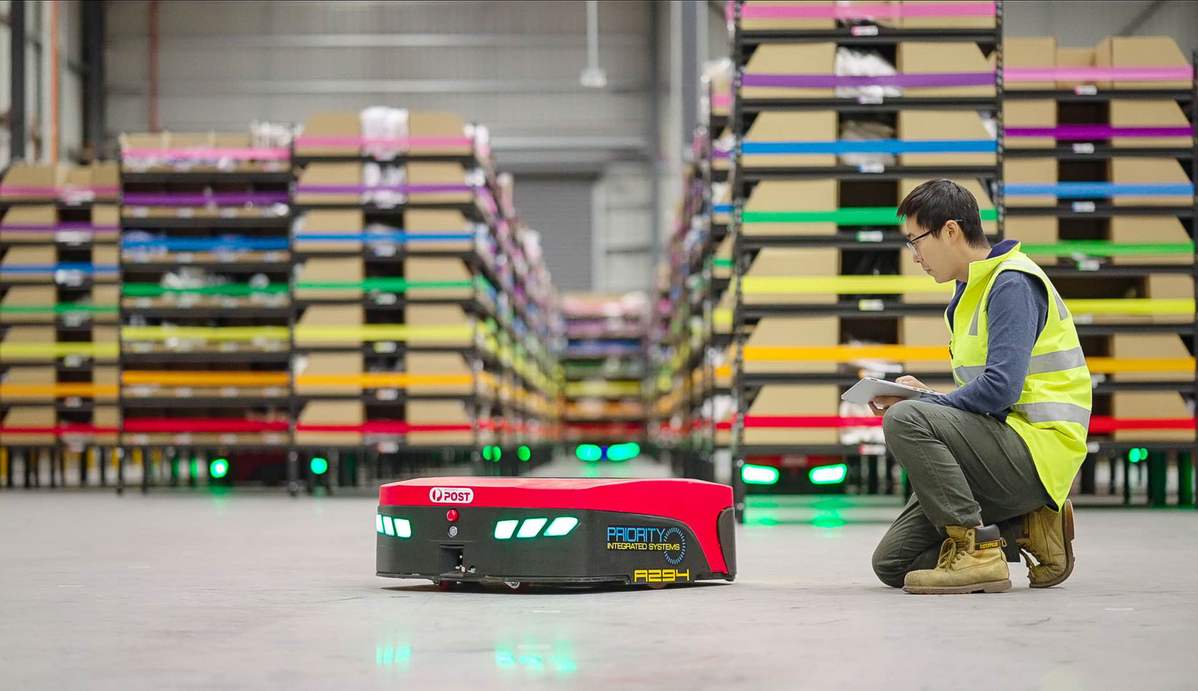Mushiny rides smart warehousing wave for global expansion


Supported by more mature smart solutions, robots are becoming increasingly common in warehouses amid a growing phenomenon in manufacturing and logistics centers, as both sectors often require constantly upgraded solutions to boost efficiency and reduce labor costs, especially at a time when the COVID-19 pandemic has been weighing on smooth operations in industrial chains.
"Using autonomous mobile robots in logistics centers no longer counts as news as e-commerce is booming globally, especially in our nation. There are way more industrial scenarios that can apply such robots as the best answers," said Liu Ming, CEO of Mushiny Intelligence Co, a provider of warehouse automation solutions and robots.
"From huge facilities to stock raw materials for big automakers, to small warehouses beside convenience stores for piled-up consumer goods, there are AMRs (autonomous mobile robots)," Liu said.
Unlike traditional warehouses where assortment of goods is mostly finished by human labor, warehouses with AMRs leverage integrated management systems to assign delivery missions and arrange robots to carry "goods to their Mr/Mrs Right", rather than employees finding them with their naked eyes. Also, robots are often designed to withstand tougher work environments.
According to a report by Interact Analysis, a market research institute, in 2021, shipments of AMRs have soared more than twofold to over 100,000 units from 2019, a 36-percent growth year-on-year in revenue for manufacturers of the high-tech helpers. The China Mobile Robot and AGV/AMR Industry Alliance reported that sales recorded among Chinese mobile robot makers reached 12.6 billion yuan ($1.87 billion) in 2021, up 64 percent year-on-year.
The increasingly wider inclusion of AMRs in warehousing solutions, and the eye-catching growth reported by many robot manufacturers in recent years, have spurred increasing participation by smart device makers at home and abroad. Mushiny is among several domestic peers that have taken early steps.
"I was with Amazon back in 2012 in charge of part of our warehouse operations. And that was when Amazon Robotics acquired Kiva Systems, itself a robot maker. Seeing the warehouses equipped with robots topping the performance list every workday, I knew the time for smart warehousing had come, and this is also part of the reason I started Mushiny," Liu added.
Established in 2016, Mushiny is based in Suzhou, Jiangsu province, providing warehousing solutions and robots to customers in 20 countries and regions, and 50 percent of its revenue comes from overseas markets, according to the company.
Australia Post, the government enterprise shouldering postal services in the country, is one of Mushiny's overseas customers. As part of its efforts to better ride the e-commerce trend in warehousing, Australia Post in 2019 leveraged Mushiny's robots to utilize a multifunctional algorithm-based workstation, which in the first week helped raise core efficiency fivefold.
Also providing services for warehouses belonging to home appliance giants like Midea Group and Suning.com, as well as overseas e-tailers such Coupang.com and ELAND in South Korea, Mushiny has witnessed an average annual revenue growth of 100 percent in recent years, a success Liu attributes to Mushiny's experience not only in robots, but also in warehousing.
"One of the compliments that we have heard most from our customers is that Mushiny knows about warehousing. Robots are not the only things they want, but also for their stocking facilities to function well and produce excellent ROI, and that's what we are delivering. Also, though facing pandemic headwinds, Mushiny is still keeping its promise to customers regarding global deployment within 60 days, which I think is difficult for our peers to guarantee."
To further consolidate its position and enhance market competitiveness, the tech company announced on May 20 the establishment of its first global research and development center, located beside its under construction-production facility, in Jiangbei New District, a high-tech zone in Nanjing, Jiangsu province. With an investment of 100 million yuan, the complex, covering 7,445 square meters, will play a key role for Mushiny in its integrated development of software and hardware.
"Looking ahead, Mushiny will not only seek a bigger role in the domestic market, but also further sharpen its competitive edge in overseas markets," Liu said, adding that the company's next target is the European market.
Companies like Mushiny have been continuously attracting investor attention in recent years. According to the China Mobile Robot and AGV/AMR Industry Alliance, a total of 79 financing cases were reported in 2021 alone, totaling 4 billion yuan, with 38 percent recording over 100 million yuan in financing value.
"The love affair with the sector will continue. Boosted by the nation's efforts to seek high-end manufacturing and supported by technological improvements, the mobile robot sector will witness significant progress in the next two years," said Kong Zhen, a logistics expert with Beijing Information Technology College.
"Companies really should learn the industrial requirements better and go deeper with robot designs to enable them to further meet market demand, which can help them better tap and unleash market potential," Kong said.




































